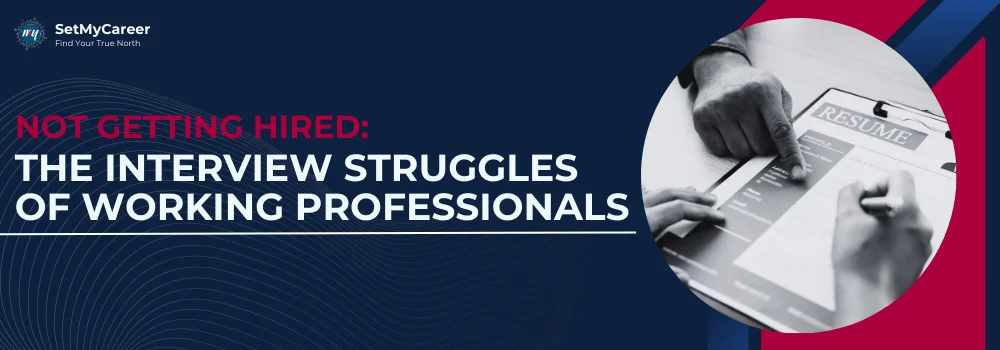
Published by SetMyCareer Editorial Team on 31 May, 2024
The SetMyCareer editorial team is comprised of subject matter experts with many years of experience across diverse domains. We thoroughly vet and fact-check all content before publishing to empower readers by shaping their careers with insightful, actionable advice backed by psychology and research.
This blog explores the common interview struggles faced by working professionals and provides insights and strategies to help them overcome these challenges and achieve career success.

Have you ever found yourself in a situation where, despite your qualifications and work experience, you just couldn't seem to crack that job interview? You're not alone. Many working professionals face challenges when it comes to acing interviews, even for roles they are well-suited for.
Perhaps you struggled to articulate your accomplishments effectively or failed to convey your true potential. Maybe you felt underprepared or overwhelmed by the pressure of the interview setting. Whatever the reason, not getting hired after an interview can be disheartening and leave you questioning your career path.
In this blog, we'll delve into the common interview struggles faced by working professionals and provide insights to help you navigate these challenges successfully. From understanding the root causes to practical tips and strategies, we'll equip you with the tools you need to confidently present yourself and ace your next job interview.
Even highly skilled and experienced working professionals can struggle to crack interviews due to various reasons, including:
By identifying and addressing these common pitfalls, working professionals can improve their chances to ace interviews and land in their desired roles, positioning themselves for success in their career journeys.

Master interview techniques and put your best foot forward
Ace Your InterviewThoroughly research the company, what they do, their values, and the job you're applying for. This information will help you customize your answers and show how well you'd fit in the role and organization.
Participate in mock interviews with friends, family, or a Career counsellor. This will help you identify areas for improvement, build confidence, and refine your responses to common interview questions.
Instead of vague statements, provide specific examples and quantify your achievements with metrics or numbers. This will help interviewers understand the impact of your contributions.
Develop thoughtful questions that showcase your interest in the company and the role. Intelligent questions can demonstrate your preparedness and intellectual curiosity.
Appearance matters.Dress in professional attire and make sure your grooming is flawless. This will help you make a positive first impression and project confidence.
Express your genuine enthusiasm for the company and the role. Share how your skills, experiences, and values align with the organization's mission and culture.
After the interview, send a thank-you note or email to the interviewer(s), reiterating your interest and highlighting any additional relevant points you may have forgotten to mention.
No matter what the result, approach each interview as a chance to learn and grow. Reflect on your performance, seek feedback, and use the insights to improve for your next interview.
Remember, the interview process is a chance to showcase your qualifications, personality, and potential. By following these tips and remaining focused, confident, and prepared, you can increase your chances of making a lasting positive impression and landing your desired job.
Overcoming interview struggles as a working professional requires a combination of self-awareness, preparation, and a willingness to seek guidance. By understanding the root causes, leveraging Career counselling for working professionals, building confidence, and tailoring your approach, you can unlock your true potential and navigate the interview process with ease. SetMyCareer is here to guide you along your career path, providing the support and strategies you need to achieve your professional goals.
No. 14/595, 1st Floor, Nanjappa Reddy Layout, Koramangala 8th Block, Bangalore 560095